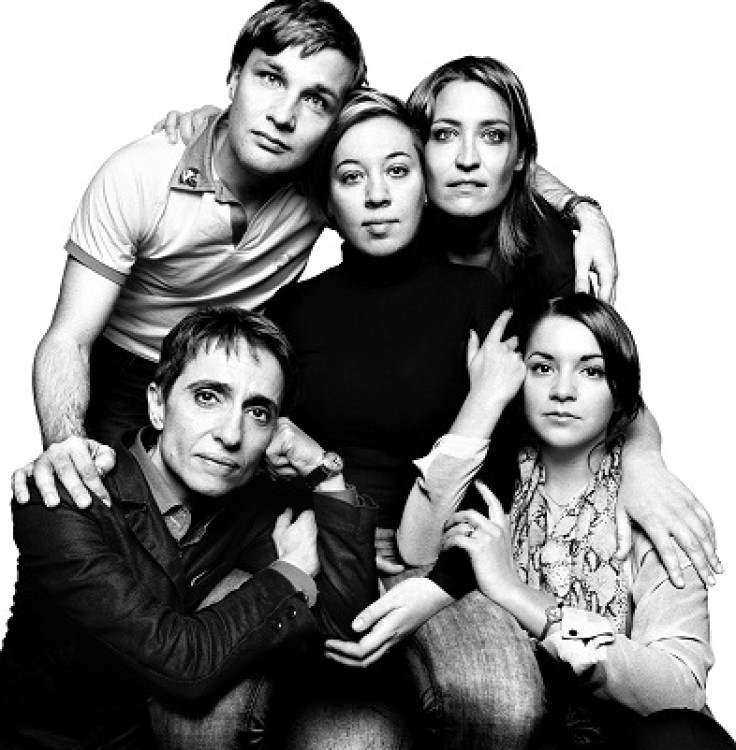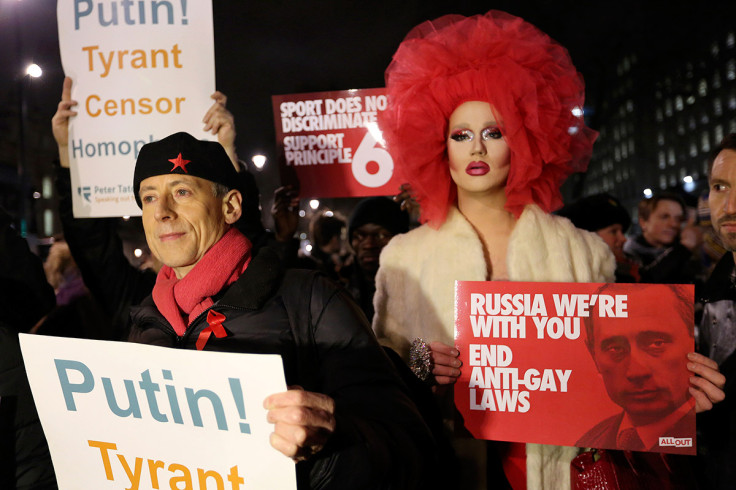Sochi Olympics 2014: Meet the Real Heroes Waging the LGBT Crusade

To be an Olympic host, a government must commit to the principle that "any form of discrimination ...is incompatible with belonging to the Olympic Movement." As guardian of the Olympic flame, the International Olympic Committee, which oversees the games, is bound by its own charter to uphold these "Fundamental Principles of Olympism" and to "act against any form of discrimination affecting the Olympic Movement."
Yet over the past two years, Russia has rolled out repressive laws imposing new restrictions on freedom of speech and assembly, and aiming to taint some non-profit organisations as "foreign agents." It has carried out "inspection" raids on independent groups and locked up high-profile activists. This crackdown has been completely at odds with the Olympic ideal of "promoting a peaceful society concerned with the preservation of human dignity."
In 2013, the crackdown expanded to include a new anti-gay law banning "propaganda" among minors that would assert equality between "nontraditional" (read LGBT) and "traditional" sexual relationships. The law applies to all types of media, blatantly violates Russia's obligations to guarantee non-discrimination and respect for freedom of expression, and contradicts the Olympic charter's principle of nondiscrimination. The IOC and many national Olympic committees have taken the unprecedented step of warning their athletes not to speak out in favour of gay rights or in any way to signal concern about discrimination and other rights abuses in Russia.
Meanwhile, homophobic rhetoric—including by Russian government officials and celebrities and on state television—accompanied debate about the law. In this poisonous atmosphere, incidents of violence and harassment of LGBT people and activists have multiplied. Organised nationalist groups have entrapped and attacked gay men across Russia, and even filmed and publicised these attacks, with no fear of being brought to justice.
Yet despite the tidal wave of repression and violence, despite the campaign to demonise the LGBT community, a group of activists are fighting for human dignity. This article serves as a podium to honour their courage, their integrity and their single-mindedness in doing what is right, despite the consequences. They won't get gold medals, seven-figure endorsement deals or global fame in return, but their achievements are every bit as vital as those of the athletes taking part at Sochi.
Here are five of the bravest and most influential activists waging the LGBT crusade in Russia:
1. Konstantin Yablotskiy
Konstantin Yablotskiy is a competitive figure skater who won a gold medal at the Cologne Gay Games in 2010. He is co-president of the Russian LGBT Sports Federation, the only organisation dedicated to supporting gay athletes in Russia. The Federation will stage its first 'Russian Open Games' to celebrate LGBT athletes from 26 February to 2 March in Moscow.
Yablotskiy has a PhD in analytical chemistry and teaches science to children with disabilities. Speaking about the Sochi Winter Olympics, he said: "Probably it's our last chance to try to change this situation, to change attitudes of Russian society, to show people that we are not marginal sodomites. We are normal people who have their normal lives, who can do sports and win medals."
2. Maria Kozlovskaya
Maria Kozlovskaya is a St. Petersburg-based lawyer who has put her life on the line to help defend LGBT victims of hate crimes. She works for the Russian LGBT Network, an umbrella group of nearly five dozen regional organisations that document abuses against LGBT people in Russia, including homophobic murders and other violent crimes, and employment and healthcare discrimination. She describes the anti-gay "propaganda" law as a "green light for nationalistic groups to make violence against LGBT people."

3. Elvina Yuvakaeva
Elvina Yuvakaeva loves to snowboard at Sochi ski resorts and took up badminton because she wanted to compete in the Gay Games, which are typically held in the summer months. She is co-president of the Russian LGBT Sports Federation, which includes Olympians and Paralympians among its more than 800 members.
Following a meeting with IOC President Thomas Bach in November 2013, Yuvukaeva said: "We fear that after the Olympics and Paralympics, when the attention of the world decreases, homophobic repression will become even worse, with, for example, the reintroduction of the bill to remove children from gay parents."
4. Anastasia Smirnova
Anastasia Smirnova is the spokesperson for a coalition of Russian LGBT rights groups. She and activists saw the need and opportunity to stand up publicly for equality at a time when Russia's homophobic laws sharply contrasted with its role of Olympic host, and duty to openly welcome all the world's communities.
Fluent in English, Smirnova is a brave face of a movement under grave attack. "Ours is a campaign for equality," she says. "It is a campaign that promotes the idea of human dignity for LGBT people in Russia—but it is not a campaign against the country."
5. Masha Gessen
Masha Gessen is a leading writer on Russia and long-time gay rights activist in the country. The Wall Street Journal praised her 2012 biography of President Vladimir Putin, "The Man Without a Face," as an "unflinching indictment of the most powerful man in Russia."
She recently moved her family, including three children, out of Russia, after the authorities threatened to pass a law removing children from families with gay parents. She has denounced Russia's anti-gay propaganda law as "part and parcel of a greater crackdown on civil society, which includes the laws on foreign agents, laws expanding the definition of espionage and high treason, and laws paralysing the work of NGOs."
Minky Worden is director of global initiatives at Human Rights Watch, and a passionate critic of the Sochi games and Russia's treatment of the LGBT community.
You can follow Minky on Twitter, or visit the Human Rights Watch website to find out more about the group's activities in all spheres of human rights. HRW has created a dedicated website entitled 'Russia's Olympian abuses', which can be found here.
© Copyright IBTimes 2024. All rights reserved.





